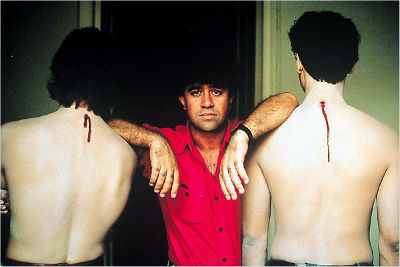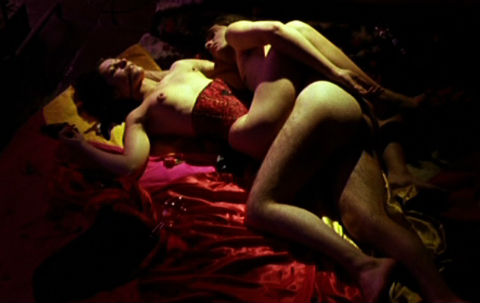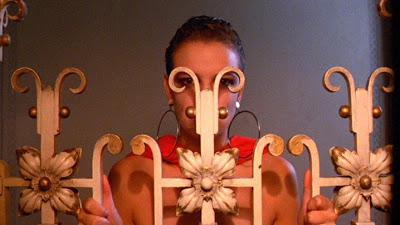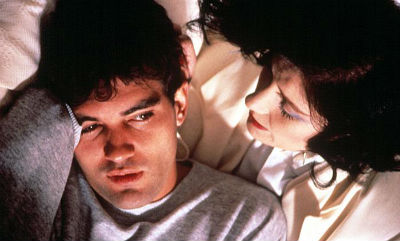
In principle, I wanted to write a
story in which death was a palpable presence. In terms of
characters and culture, I identify more with Buñuel's "Archibaldo
de la Cruz"() than Bergman's "The Seventh Seal." More than
anything, I am closer to myself and, as such, I have never had
clear criteria on the subject of death. That was one of the reasons
why it attracted me: discovering what my own position is with
regard to a reality that is as inevitable as it is unfathomable, a
daily yet eternal occurrence which, like many other things about
human nature, I have never quite accepted.
If I abide by the results of the
script, death for me is an element of sexual excitement, with all
that implies. A supreme act of vitality; clean, painful, amoral and
closely linked to beauty and love. I'm not saying that death is
only that - by no means. What I'm saying is that this is the
possibility that attracts me most.
With this film, there are many
things I want to express - many of them I can only sense. I really
don't know where to start. Perhaps the best thing is to begin with
the title:
MATADOR
After making my last movie and the
difficulties I had with the credits and the title, which did not
fit on the screen, I promised myself to come up with a short name
for my new film. Although I might be viewed as naïve or
pretentious, I was also after an international title, one that
would not need translation no matter where it showed. In our
language, there are not many such words; I had to choose between
"Carmen", "Lola", "Generalísimo", "golpe", "flamenco", "guerrilla",
"corrida" and MATADOR. I didn't hesitate in opting for the latter
because, apart from fulfilling the required brevity and
internationality "Matador" conceals the essence of the main
story.
A "Matador" is someone who kills,
and that applies to both leading characters; Diego Montes and María
Cardenal. Although neither of them is a common murderer; they don't
kill because they are crazy, because of money, hatred, an ideology
or armed conflict, they kill for love and pleasure. For both of
them, killing is the maximum expression of physical love.
With this movie, I intend to tell a
sort of legend, utilizing and abstracting many elements from our
culture.
I'd dare to formulate a theorem
(similar to Pasolini's): "If one day you find a character whom
you've only dared to dream about, you won't be able to turn your
back on him. Something far more powerful than reason will push you
towards him, without you caring if it is going to be a mortal
encounter".
"What makes these two characters
unique? What makes them outstandingly different from their
environment?"
"Their need to love and kill at the
same time. This turns them into myths."
He is a retired bullfighter because
he had been severely gored early in his career.
She is a lawyer who imitates the
way he kills.
After leaving the bullrings for
good, he sets up a bullfighting school, but he has to go on killing
because "giving up killing is like giving up living". She too likes
killing, and she does it at the moment she physically gives herself
over to others, imitating the bullfighter's way of killing.
However, they both do it on their
own. They've never had an accomplice join them in their acts. While
one shouldn't scorn the act of enjoying solitary pleasures, there
are times when reciprocity is indispensible, like in the case of
love.
"Matador" is an amoral, romantic
story. The characters live only for love. Actually, that doesn't
just apply to the leading characters. "Everybody loves someone"
could be another title for the film. The bullfighter loves the
female lawyer, but she puts up obstacles in the way; her self
doubt, the doubt of someone who has dreamed too long about
something then discovers that its fulfillment is close at hand.
Eva, a young female model, is in love with the bullfighter; when
she discovers his "hobby," she is prepared to sacrifice herself or
reform him in order not to lose him. The police inspector is in
love (although it might go unnoticed in the script because it isn't
specified in the dialogues) with Ángel, Diego's pupil who, due to a
terrible guilt complex, declares himself perpetrator of all the
crimes that take place around him. Julia, the psychiatrist that
treats him, is in turn in love with the police inspector and
doesn't give up hope on re-conquering something she has never had.
Then there is Berta, Ángel's mother, an intolerant woman from Opus
Dei who loves God fanatically.

In her delightful memoirs, Anita
Loos says of her boss, Irving Thalberg, that amongst others there
was an imposition that invariably kept turning up at the time of
discussing a script: "The leading character must be in love with
someone, if possible, with the leading female character". There was
this film, I don't recall the title, in which this condition was
difficult to fulfill by the female scriptwriter without undermining
the narrow-minded morals of the period in which it was filmed. The
leading characters were a brother and a sister. The brother
couldn't be in love with his sister and there wasn't any other
important character with whom he could fall in love. When Anita
Loos explained her problem to Thalberg, the latter replied: "Well,
in that case make him fall in love with himself." Anita therefore,
sure enough, turned him into a narcissist. Irving Thalberg would
have been delighted with this script; there is enough love in it to
fill the needs of several movies, although, probably he would not
have agreed with the tone of my movie. I want to do a romantic
film, but I don't want it to be melodramatic at all, on the
contrary, I want it to be very fierce. I intend to move the viewer
with wild emotions.
Beauty has always been condemned to
death (Ava Gardner almost always had to die in her films) and I'm
not just referring to physical deterioration, which is a passive
form of death. Beauty, love and passion are always exceptions
because of their irrational nature that scheme against order. I
wouldn't know exactly which is the hand of the executioner who
applies the punishment, because there are many. No order, no
ideology, has protected or simply admitted that which is beautiful
or passionate, because both things are uncontrollable.
Like in all grand legends,
"Matador" is marked by death, but not by doom. I refuse to allow my
characters to be condemned…I rebel against that fate.
But, how can we flee doom to be the
owners of our wishes, of the love that brings them about and of the
beauty which produced such feelings?
The solution is for us to decide
for ourselves about our own death, to snatch the scythe from
destiny and become our own executioners and, more importantly, to
feel infinite pleasure in doing so.
This is the case of my
protagonists. By deciding on their own tragedy and turning it in
their only source of pleasure, they mock fate and defeat its
threats.
I have spoken about love and now I
will talk about beauty, even if in the future when the movie is
finished these words turn against me. Beauty, in all its different
shapes & forms, is a key element in "Matador"…the beauty of the
light, the characters, the music, set designs, the dialogue.
THE LIGHT. As an esthetic option, I
had contemplated two alternatives: make a film about crime in which
the blood splashed onto the viewer along the lines of "The Texas
Chainsaw Massacre", or the contrary, an elegant and exquisite film
where violence would be replaced by emotion and feelings. I opted
for the latter, as a counterpoint to the "dreadfulness of the plot
and to shake off my shoulders the eternal question "why am I only
interested in shabby stuff?"
Ángel Luis Fernández will be in
charge of illuminating my dreams and putting shadows on my
nightmares. As reference points, I have resorted to the large
melodramas of Douglas Sirk, the magical transparency of "Pandora
and the Flying Dutchman", the disturbing stillness of Zurbarán, the
aggressiveness of the primitive Trucolor (Duel in the Sun,
especially) and I don't know how many other things.
The result probably won't resemble
any of these films, and yet may resemble all of them. Because Ángel
Luis is a young camera operator, gifted with extraordinary
intuition, as he already proved in "Arrebato, Entre tinieblas or
Ópera prima". In New York, Néstor Almendros asked me a lot about
him after watching "Que he hecho yo..."
But Angel's skills would be of no
use if we didn't have the adequate…

SET DESIGNS. Almost all of them,
apart from their realist meaning, are metaphorical places that not
only represent space but also the spirit and emotions of the
characters. Very large, with several zones of light, lively and
dense colors, they represent a firmament through which the
characters evolve as if they were celestial bodies, especially the
two leading characters, who will always shine with their own light,
independently from the environment. The sky itself of Madrid
becomes an important backdrop with its spectacular clouds that
affect, represent and frame the turbulence of one of the characters
- Ángel, the victim of a monstrous and intolerant upbringing and a
passionate admiration for the master matador.
Pin Morales and Román Arango,
regular collaborators of Berlanga, on this occasion, are in charge
of the set designs. All of the latter are most unusual and all of
them located in Madrid, a city that provides locations that are far
more surprising than what I thought.
THE PLAYERS. Judging by its five
main players, "Matador" could also be called "The Strange Case of
the Five Beauties". All of them are good-looking, and I'm not
referring to banal and decorative beauty, but an extraordinary
beauty that will stun and disturb the viewer..
Nacho Martínez is the bullfighter.
Having lost ten kilos, dressed and advised by Cossío, he bears
little resemblance to the character in a previous film where he
played the role of the mute, good-natured brother of Tasio. Nacho
possesses the gravity of an outstanding bullfighter. His face is
ageless. Beyond some very deep wrinkles, there seems to hide the
conscience of an inevitable tragedy, of pain that comes from
vitality. His sobriety expresses everything. Has someone ever seen
a bullfighter smile? I most certainly haven't.
Assumpta Serna is María Cardenal.
She is cold and unfathomable, until she decides to talk; then her
mouth is like that of an oven. María is made of transparent ice,
but deep inside her there is a genuine fire. We have clad her in
black which accentuates the angles of her face. She resembles a
mixture between Anouk Aimée and Fanny Ardant. One always senses her
great capacity to dive into the forbidden, but this time she is
going to prove that she can also express a limitless passion and
that her seeming emotional distance is just a mask she hides behind
while she waits.
Eusebio Poncela plays the role of
police inspector. The aura of toughness, mystery, ambiguity and
sarcasm that has settled around Eusebio over the last twenty years
fits him like a glove in this role. He is more a criminologist than
a policeman; he is not interested in doing justice for he has no
morals. He is just interested in knowing if someone "has done
something wrong" and "how they did it". Sober, elegant, skeptical,
Eusebio's image as a police inspector is going to be very different
from that of the usual cop. From the very start, he is fascinated
by the beauty and defenselessness of the presumably guilty Ángel.
All his investigations seem to be more geared towards proving his
innocence than his guilt. He never talks about himself, but the
spectator will find out certain things from "what he looks at" and
"how he looks at it." Uncomfortable and slippery, I expect Poncela,
whose acting career is short though peculiar and brilliant, tol
play this role with the same skill he has shown in other films.
Eva Cobo and Antonio Banderas play
the roles of the young couple. Although only 18 years old, Eva has
the strength and character of the great melodramatic heroines of
the 1940s. She plays the role of a woman in love prepared to fight
tooth and nail for her man, to the extent of lying to herself when
she finds out he is a murderer, and with the naïve self-confidence
that her love will redeem him. But Diego isn't like the other
characters, even if she denies the evidence. He belongs to another
species, the species of María Cardenal.

Antonio Banderas is Ángel, Diego's
pupil, someone who seeks some sort of punishment in bullfighting.
His admiration for his master and a terrible guilt complex makes
him feel and declare himself guilty of everything. Banderas is an
expert artist, despite the fact that he is only twenty-odd years
old. He is fresh, kindhearted and intense. With parts in two other
films: "Réquiem por un campesino" and "La corte de Faraón", this is
going to be his year. This is his most complicated role yet, but,
with an actor like him, I'm on safe ground.
Apart from these five "beauties", I
am also working with three women who are indispensible: Julieta
Serrano, Carmen Maura and Chus Lampreave.
Working with them has been for me
not just a privilege but a continuous emotion. The three are born
actresses. They are exceptionally gifted. Each has a totally
personal technique and they are so generous that I'll never be
grateful enough to them. Their mere presence makes the characters
whose role they play grow in stature.
I admit that I am a fan of the
three of them and it is a known fact that fans have no restraint
when they talk about their idols. At any rate, one only needs to
glance briefly at their work to see that I'm not exaggerating.
But there are many other people
collaborating in "Matador". Jesús Ferrero, the author of
"Belver-Yin", has helped me with the script. Bernardo Bonezzi, like
in the movie "Qué he hecho yo...", will be in charge of the music.
A troop of new Spanish costume designers -all of them big shots in
their trade - will be in charge of dressing the characters (Francis
Montesinos will take care of Eva Cobo, Angeles Boada will dress
Assumpta Serna, Antonio Alvarado will look after Eusebio Poncela,
etc.). The jewelry has been designed by a young genius called Chus
Burés.
I feel as if I haven't really said
anything about the film itself. It is difficult as well as boring
to express everything one feels for a movie a few days before the
shooting. The most important thing about the cinema is to make
films. That is what my adventure is all about.
It's been a long time since I
wanted to do "Matador". I now discover that it is indispensible for
me to do it and I don't know why.
I thank God and Andrés Vicente
Gómez for fulfilling my wishes. I am also most grateful to my
brother Tinín (the Almodóvar saga continues), to Rafael Monleón (my
right-hand man), to Cossío (a refined costume designer and a very
dear friend), to Esther García, a woman who proves that sexy things
are not incompatible with production, Marisa Ibarra (as silent as
the
Gioconda, also, nothing escapes
her), to Eusebio Graciani (loyal, helpful, efficient, insatiable
worker), Miguel Gómez, etc., etc.
PEDRO ALMODÓVAR (1986).